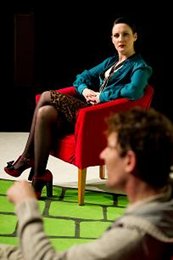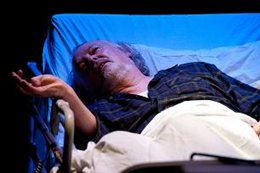What does the future hold for a terrorist when the war is over? It’s not the first time that question has been asked in a play about Northern Ireland but it’s the first time that two playwrights from different generations and backgrounds have been commissioned to write interlocking pieces on the same subject.
Belfast-based Ransom was born in 2002 out of the imperative to develop and stage new Irish writing. It was formed by director Rachel O’Riordan and actor Richard Dormer as a means of producing Hurricane, Dormer’s coruscating one-man show about snooker champion Alex ‘Hurricane’ Higgins. Nine years down the line, an impressive body of work bears testament to its continuing commitment to that original aim.
In starting to shape her vision for Both Sides, O’Riordan could not have chosen two more sharply contrasting writers, both of whom were first developed by Ransom. David Ireland comes from a Belfast Protestant family and is the current wunderkind of Northern theatre - playwright-in-residence at the Lyric Theatre and winner of the Stewart Parker Trust BBC Radio Drama Award and the Meyer Whitworth Award. Robert Anthony Welch is an Irish-speaker from Cork, a distinguished academic, poet, novelist, critic, literary editor and Professor Emeritus.
But having got the ball rolling, O’Riordan has handed over the reins to Mick Gordon, one of London’s most highly regarded directors. The reason is that in January of this year, she took up the post of creative director at the Perth Theatre, though, as artistic associate, she remains the driving force behind Ransom.

Neither is there anything remotely comfortable about either piece. Ireland’s crazily surreal comedy Yes So I Said Yes focuses unflinchingly on the causes and punishments tormenting his own community. It is beset by mad dogs of all descriptions and contrives to make audiences feel distinctly ill at ease, though not necessarily for the right reasons. Welch’s Static is a patiently crafted portrait of an old republican hardliner, raging against the dying of the light, while the cause to which he dedicated himself moves on without him. It challenges us to feel sympathy for a character, who has lived by the gun and is now at the mercy of excruciating terminal illness.
Against Gordon’s sketchy, cartoonish set for Ireland’s play, our first encounter is with former loyalist paramilitary Alan ‘Snuffy’ Black (JD Kelleher), who the conflict has left a quivering, delusional wreck, incapable of rational thought. The barking of his neighbour’s dog is sending him demented and his narrow little world is populated by strangely-named Catholics, a buffoonish doctor (Paul Mallon), a seductive therapist (Charlotte McCurry) and sadistic, foul-mouthed thugs (Gerard Jordan and Conor MacNeill).
In hammering home the point that Snuffy and his tribe believe themselves to have been raped by the peace process, Ireland goes down a comedic path, which some may find distasteful. So far gone in the head is poor Snuffy that he and the offending dog have a chat abut the problems of castration and sexual frustration. The dog asks for help. Reluctantly, Snuffy agrees, only to be caught in flagrante by a pair of violent young loyalist hoods. As if one such demeaning episode were not sufficient, he is then condemned to suffer another, as the dog’s elderly owner (Roy Heayberd) gleefully takes his revenge in like manner, while the rest of the cast sing a jolly song. One wonders whether Ireland had the 'Springtime for Hitler' scenario from The Producers in mind, but this is queasy stuff, delivered in a manner that suggests that if you don’t find the whole ludicrous thing hilariously funny, it’s your problem.
 The softly-lit hospital bed, in which grizzled republican Denis McShane (Heayberd) lies dying, dominates the set of Static. Like a shrine, it is visited in turn by his devoted henchmen (Jordan, Mallon, MacNeill), young men whom he has raised in his own dubiously principled ideology; by an attractive young woman (McCurry), unafraid of catching his famously roving eye while pursuing her own tragically-motivated agenda; and by a smooth-talking wheeler-dealer (Kelleher), enmeshed in self-serving racketeering and violence and representative of everything about the new order that McShane loathes and detests.
The softly-lit hospital bed, in which grizzled republican Denis McShane (Heayberd) lies dying, dominates the set of Static. Like a shrine, it is visited in turn by his devoted henchmen (Jordan, Mallon, MacNeill), young men whom he has raised in his own dubiously principled ideology; by an attractive young woman (McCurry), unafraid of catching his famously roving eye while pursuing her own tragically-motivated agenda; and by a smooth-talking wheeler-dealer (Kelleher), enmeshed in self-serving racketeering and violence and representative of everything about the new order that McShane loathes and detests.
Rendered impotent by age and unbearable pain, his final hours are dominated by confused memories of the violent deeds he has perpetrated during a lifetime devoted to rearing and training horses. In the central role, Heayberd gives an immensely courageous performance, delivering the images raging through his addled brain with a brutal yet tender poetry. Welch leaves us with the unsettling thought that, in the hands of the sophisticated strategists of the new dispensation, worse might yet be to come.
Jane Coyle is a Belfast based arts journalist, performing arts critic and screenwriter, who also reviews for The Irish Times, The Stage and Culture Northern Ireland.